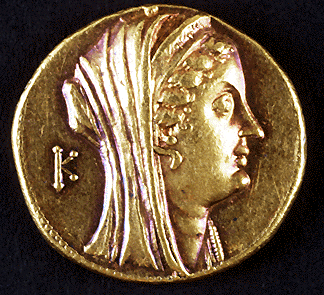

Kelsey Museum of Archaeology 63.3.1: Gold coin of Ptolemy II
In the papyri, monetary amounts were indicated through the use of a symbol (similar to a + sign) much as we would use a dollar sign. In the example below, a number follows the monetary symbol. Do you remember what number π is? If not, you can look at the numbers here.

Prior to the conquest of Alexander, coined money was used only to determine how much something cost, and not as a means of payment. When Greek mercenaries first came to Egypt in the 5th century, the Egyptian king had to import Athenian sllver coins in order to pay them.
The symbol that has been written on this papyrus means "drachmas," the main value of the monetary system under the Ptolemies and later under the Romans. The tetradrachma (4-drachma coin) or stater, was the principal coin in use during the Ptolemaic period. The monetary system of the Ptolemies included the following coins and denominations:
| Greek name | Value |
| τάλαντον | 6,000 drachmas |
| μνᾶ | 100 drachmas |
| στατήρ | 4 drachmas |
| δραχμή | about 3.5 grams silver |
| ὀβολόϲ | 1/6 drachma |
χαλκοῦϲ |
1/48 drachma or 1/8 obol |